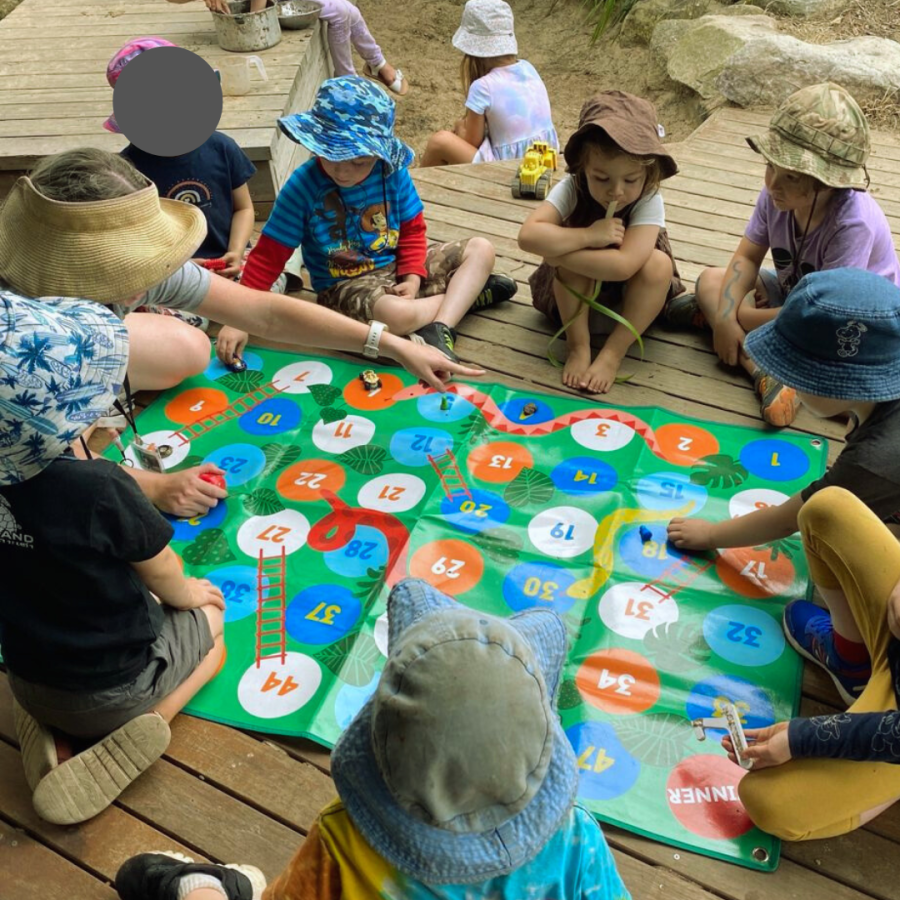
How preschool games develop life and school readiness skills
Games are a perfect match for early childhood education and care settings. From Duck, Duck, Goose! to Hungry Hungry Hippos to Snakes and Ladders, games organise groups of children, encourage connections between children and help children develop cognitive, social and motor skills. These life skills contribute to a child’s readiness for school where they will have had practice taking turns, being patient, utilising memory recall, solving problems, communicating, listening, concentrating, practising teamwork, exercising spatial awareness and more.
Families can (and should) play games too – depending on your family dynamics, it may be unlikely that you have 3-4 children that are both developmentally ready for games and have a desire to play them. Preschool is a great place for gaming!
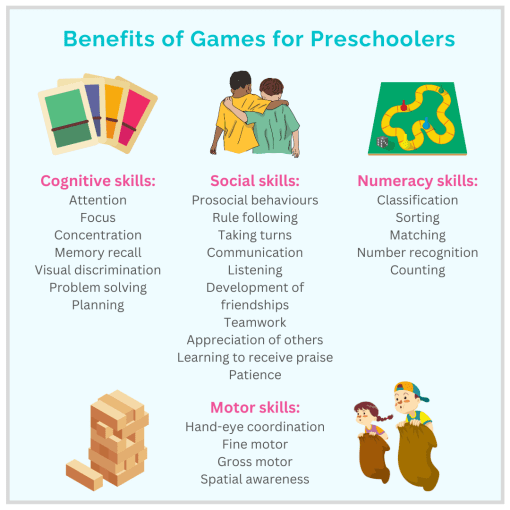
Read on to learn more about how games affect children’s development.
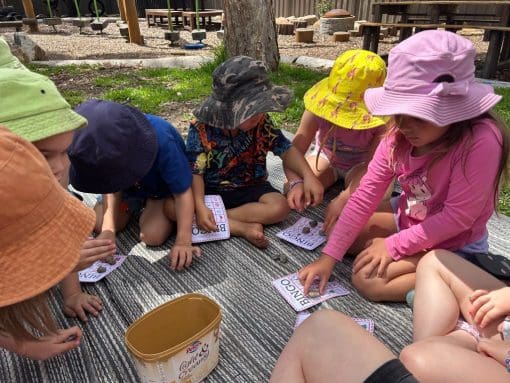
Cognitive skills
Abundant life skills are practised in the game space that adults often take for granted. All games require mental effort, but card games like ‘Spot It!’ and memory involve a higher level of these capabilities. During games, children exercise their brain functioning to grow in the following:
- Attention and focus – Games require children to be attentive, especially during key moments, such as the turning over of cards in a memory game or when a ball is coming their way. Children learn when they need to turn on that focus and experience the consequences of tuning out at the wrong time.
- Concentration – When children endure their focus for a long period of time, they practise concentration. This is needed during many games, like card games and games that involve hand-eye coordination.
- Memory recall – In card and board games, children attempt to remember where X is and then have to wait to execute this recall on their turn.
- Visual discrimination – Many memory games involve the ability to recognise and discern differences or link two related images together. This helps children develop visual recognition and discrimination.
- Problem solving – Games inherently involve challenges, sometimes by chance involved in the game, or due to someone’s mishap – either way children have to deal with these on the fly – with creativity, strategy, teamwork, or more.
- Planning ahead – Children consider how to win the game and that often involves strategic forward thinking. In a simple game of ‘Duck, Duck, Goose!’ a child can make it back to their seat without being tagged by strategically choosing a player who is not paying attention.
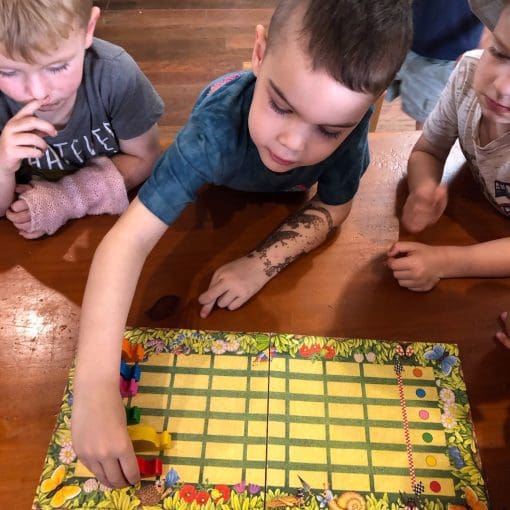
Social skills
Research conducted on preschoolers playing cooperative and competitive board games suggests that playing games conferred positive effects on preschoolers’ cooperative and prosocial behaviour (Eriksson, Stenward, Poon, Stenberg, 2021). Children can begin to learn these complex social dynamics in a game atmosphere with qualified adults supervising, scaffolding and maintaining peace as needed. Circle games where children are arranged in a ring around the centre game space, encourage children to feel a sense of belonging and community.
- Prosocial behaviours – Sharing, encouraging others, helping others, complimenting others, and celebrating the success of others can all be practised in the game setting.
- Rule following – Each game has a set of rules, and following rules requires self-control – if a child ignores the rules, they’ll have to sit out. Children learn that if they want to join the game, they must temper their own individual impulses to maintain order and fully enjoy a game with multiple children.
- Taking turns – Taking turns is a part of rule following and also involves self-control. The child must restrict themselves to one turn, even when they want another right away or are unhappy with the outcome of their turn.
- Communication – Children communicate verbally and nonverbally throughout the game. Often they speak about whose turn it is, what is happening during each turn, where a needed piece is, how they feel about the progress of the game, they encourage each other, comment on anyone who is not following the rules and more. It’s ripe for language and new vocabulary.
- Listening – As part of communication skills, children must listen to educators during games as they assist children to follow the rules and repeat the rules of the game. Children need to listen to each other during games involving teamwork and during Hide and Seek as a child counts. During a game of Simon Says, children must listen carefully to Simon so that they don’t get ‘out’ from following along without attentive hearing.
- Development of friendships – Games compel quieter children to interact with peers, even motivating them to say or learn the names of other children. The fun of the game can also distract from a child’s social inhibitions. Outgoing children have the opportunity to listen and give their attention to a child they may not have interacted with before. Games where children tap or recognise each other in different ways promote the building of connections, especially if the game is going well and there’s lots of laughter!
- Teamwork – Some games, especially outdoor games like sack races and ball games involve children to work together, encourage each other and share in a common goal.
- Appreciating the performance of others – Children notice and appreciate the gifts and hard work of other children.
- Learning how to receive praise – Children may experience encouragement and applause during or after a game. They have the opportunity to learn how to respond to others taking note of their performance.
- Patience – It’s a concerted effort for children to wait for their turn – games offer this practise.
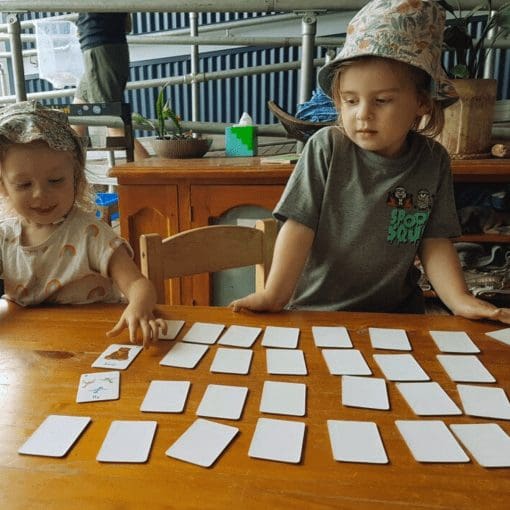
Numeracy skills
Board and card games in particular encourage the development of pre-maths numeracy skills. During the game, children have to count, recognise numbers and make discernments accordingly, in a context that is meaningful to them. It’s an effective and appropriate way to manifest numeracy in early childhood.
“Numeracy is defined in the Early Years Learning Framework as the capacity, confidence and disposition to use mathematics in daily life. It is essential that the mathematical ideas with which young children interact are relevant and meaningful in the context of their current lives…In early childhood, numeracy and mathematics can be viewed as interconnected, with each building upon and informing the other.” (NSW Department of Education)
- Classifying, sorting and matching – Any game that involves grouping, ordering, categorising and discerning the similarities and differences contributes to the child’s pre-math skills. Children must be able to differentiate properly between objects or items as a base skill from which they can then learn how to count, because they understand ‘what’ in particular they are counting.
- Number recognition – Children learn to recognise numbers themselves as well as visual representations of numbers. For example, on a dice, children learn what each number looks like as dots.
- Counting – Board games involve counting spaces as the game progresses. Hide and seek involves counting before seeking. In any game that involves the collection of something – children will count what they have gathered.
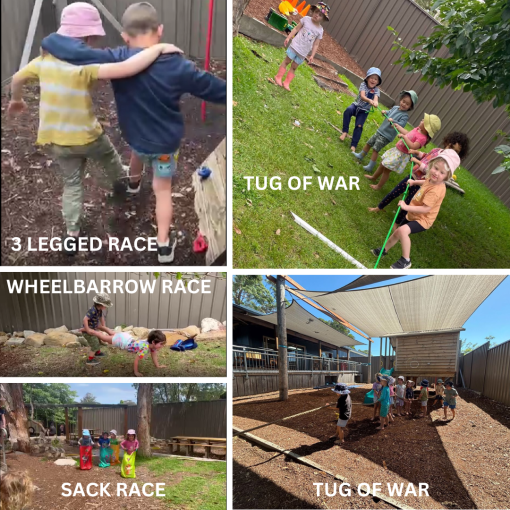
Motor skills
Researchers found that goal-oriented play improved motor development in preschool age children (Sutapa et. al, 2021). Different from free play, a game has a goal and requires the child to practise discernment and critical thinking for a desired outcome. This adds a level of push, motivation amidst a fun atmosphere that encourages children to inadvertently ‘level up’ on capabilities and skills that they are already exercising everyday. Games are fantastic representations of goal-oriented activities that can promote the increase of coordination, fine motor and gross motor skills of children.
- Hand-eye coordination – This involves how a child is able to process information visually in order to direct their hand movements to complete a task. Ball games lend well to developing hand-eye coordination, but so do other games like bowling or bean bag toss.
- Fine motor – Consider children playing Jenga, they must carefully move the blocks out without making the wobbly tower tumble. Children manipulating cards in card games or small pieces during board games are also exercising those fine motor muscles.
- Gross motor – Outdoor games like the 3 legged race and sack races involve moving quickly and/or jumping with coordination. The 3 legged race requires moving in sync with a peer across the race route.
- Spatial awareness – Children assess their own body’s positioning in relation to its surroundings – a perceptual motor skill. In a game, they need to move quickly and coordinate themselves around peers and objects. In a game of hide and seek, children have to quickly evaluate hiding spots for how well each one will cover them from view.
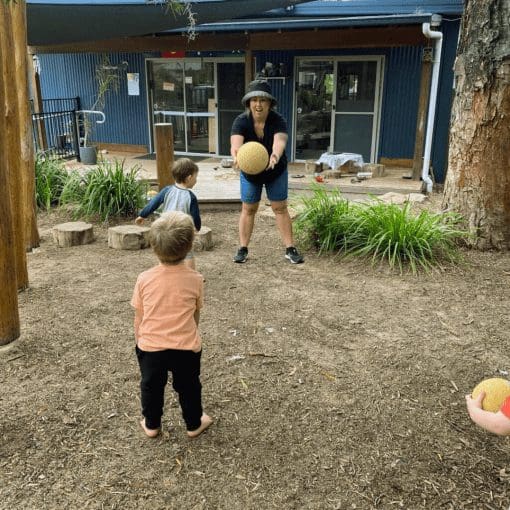
There are plenty of research evidenced reasons to play games with preschoolers, but we mostly do it because it’s fun and they insist! They seem to know what is good for them instinctively.
Below are the games we’ve been playing with our preschoolers, we hope you give some a try!
- Memory
- Spot It!
- Snakes and Ladders
- Red Light, Green Light
- Simon Says
- Jenga
- Circle Games: Duck, Duck, Goose!, Who’s Under the Rug?
- Outdoor Games: Tug o’ War, Sack Race, Three Legged Race, Wheelbarrow race
- Piggy in the Middle
- Snail Race
- Hungry Hungry Hippos
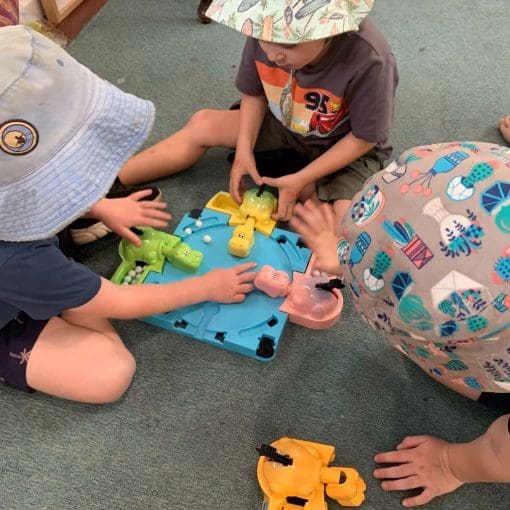
Sources:
Ehrenfeld, L. (n.d.). Benefits of board games for children and their families. Child Development Clinic. https://www.childdevelopmentclinic.com.au/benefits-of-board-games-for-children-and-their-families.html
Elofsson, J., Gustafson, S., Samuelsson, J., & Träff, U. (2016). Playing number board games supports 5-year-old children’s early mathematical development. The Journal of Mathematical Behavior, 43, 134-147.
Eriksson, M., Kenward, B., Poom, L., & Stenberg, G. (2021). The behavioral effects of cooperative and competitive board games in preschoolers. Scandinavian Journal of Psychology, 62(3), 355-364.
Mead, S. (n.d.). 9 classic preschool games that secretly teach life skills. Whitby School. https://www.whitbyschool.org/passionforlearning/9-classic-preschool-games-that-secretly-teach-life-skills
NSW Department of Education. (2024, March 21). Numeracy in early childhood. Education. https://education.nsw.gov.au/teaching-and-learning/curriculum/early-learning/professional-learning/numeracy-in-early-childhood#:~:text=Some%20of%20the%20aspects%20of,result%2C%20the%20ability%20to%20say
Sutapa, P., Pratama, K. W., Rosly, M. M., Ali, S. K. S., & Karakauki, M. (2021, November 2). Improving motor skills in early childhood through goal-oriented play activity. Children (Basel, Switzerland). https://www.ncbi.nlm.nih.gov/pmc/articles/PMC8625902/
Written By
Suzie graduated from Boston College’s School of Education with a Bachelor’s in Human Development/Applied Psychology and Communication. She moved to Australia in 2020 with her husband and growing family. Suzie enjoys working at Sustainable Play Preschool where her values in sustainability, education and care for the natural world all come together beautifully.


